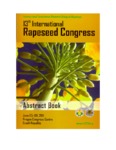Use este identificador para citar ou linkar para este item:
http://www.alice.cnptia.embrapa.br/alice/handle/doc/895035Registro completo de metadados
| Campo DC | Valor | Idioma |
|---|---|---|
| dc.contributor.author | RAMOS, N. | pt_BR |
| dc.contributor.author | BUSCHINELLI, C. C. de A. | pt_BR |
| dc.contributor.author | TOMM, G. O. | pt_BR |
| dc.contributor.author | FERREIRA, P. E. P. | pt_BR |
| dc.contributor.author | VIEIRA, H. B. | pt_BR |
| dc.contributor.author | FONTES, L. P. | pt_BR |
| dc.contributor.author | RODRIGUES, I. A. | pt_BR |
| dc.contributor.author | RODRIGUES, G. S. | pt_BR |
| dc.date.accessioned | 2011-07-04T11:11:11Z | pt_BR |
| dc.date.available | 2011-07-04T11:11:11Z | pt_BR |
| dc.date.created | 2011-07-04 | pt_BR |
| dc.date.issued | 2011 | pt_BR |
| dc.identifier.citation | In: INTERNATIONAL RAPESEED CONGRESS, 13., 2011, Prague, Czech Republic. Abstract book... Prague: International Consultative Research Group on Rapeseed, 2011. | pt_BR |
| dc.identifier.uri | http://www.alice.cnptia.embrapa.br/alice/handle/doc/895035 | pt_BR |
| dc.description | This research aimed to assess the social and environmental impacts of canola on the biodiesel production chain, as well as to analyze sustainability indicators in a reference term were canola is produced in the Passo Fundo region, state of Rio Grande do Sul, Brazil. Methodology included extensive literature review and application of two impact assessment tools: a) an Eco·certification system for rural activities (Eco·certRural) with 24 criteria for evaluating production chain impacts, based on the input of 15 experts knowledgeable on the diverse segments of the biodiesel chain in the region of the study, and b) a System for weighted environmental impact assessment of rural activities (APOIA-NovoRural) with 62 indicators based on detailed interview and field analyses with a canola- producing farmer. The assessment led to the conclusion that in the Passo Fundo region the biodiesel production chain based on canola brings mostly positive impacts on the environment and for the livelihood of people involved in its production. Since it increases the use of farming inputs and off-farm resources, the aspects related to input and resources demands were less favorable. Canola production brought important contributions for the sustainability of the reference farm, with a general index of 0.77 (in a 0 to 1.0 utility scale). | pt_BR |
| dc.language.iso | eng | eng |
| dc.rights | openAccess | eng |
| dc.subject | Brasil | pt_BR |
| dc.title | Assessment of social and environmental impacts of canola on the biodiesel production chain in Southern Brazil. | pt_BR |
| dc.type | Resumo em anais e proceedings | pt_BR |
| dc.date.updated | 2017-01-26T11:11:11Z | pt_BR |
| dc.subject.thesagro | Colza | pt_BR |
| dc.subject.nalthesaurus | biodiesel | pt_BR |
| dc.description.notes | Oral presentations, p. 92. | pt_BR |
| riaa.ainfo.id | 895035 | pt_BR |
| riaa.ainfo.lastupdate | 2017-01-26 | pt_BR |
| dc.contributor.institution | NILZA PATRICIA RAMOS, CNPMA; CLAUDIO CESAR DE A BUSCHINELLI, CNPMA; GILBERTO OMAR TOMM, CNPT; PAULO ERNANI PERES FERREIRA, CNPT; HENRIQUE BARROS VIEIRA, CNPMA; CNPMA; CNPMA; GERALDO STACHETTI RODRIGUES, CNPMA. | pt_BR |
| Aparece nas coleções: | Resumo em anais de congresso (CNPT)  | |
Arquivos associados a este item:
| Arquivo | Descrição | Tamanho | Formato | |
|---|---|---|---|---|
| Assessment....pdf | 239,54 kB | Adobe PDF |  Visualizar/Abrir |









